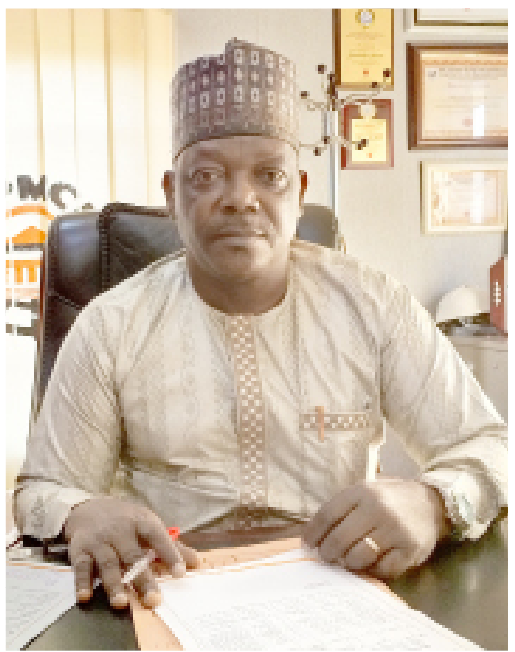Mr Timothy Zalanga, the Managing Director of the Railway Property Management Company Limited, a subsidiary of the Nigerian Railway Corporation (NRC), in this interview with Daily Trust in Kaduna, highlights strategies the agency is taking to recover its land allegedly encroached upon by the military and other government agencies. Excerpts:
Sir, when you assumed office, you embarked on the recovery of railway land across the country. How is that going?
Well, the issue of recovering railway land is a very historical one. You recall that the railway is one of the oldest agencies of government in Nigeria. As of today, we are over 120-something-years-old as a corporation and of course, the rail will be in an early coma in the nation.
They had very good foresight when they acquired a large expanse of land across the entire nation with the sole objective of ensuring that the train operation had adequate land and space required for the anticipated expansion for both where they needed at that point and also what they would need in the future. That made or is still making the NRC the largest land and property owner in Nigeria within the public sector.
You know that in the course of time, the railway operation suffered a lot of setbacks and at one point the operation was almost comatose. That has given people a lot of leverage and opportunity to encroach into a lot of railway lands, both within the cities, the towns and quite a number of other locations.
And because they were not in operation then, action was not taken early enough until such land eventually became settlements and communities. When we came in, we realised that there are quite a number of such places that have been taken over, both legally and illegally. The illegal ones are the ones that came in and just found settlements and they settled there. A good number of them are even former railway staff, former security agents, police, soldiers and so on.
The legal ones are government agencies such as the Nigerian Television Authority (NTA), the electricity company which is now unbundled and military barracks in Lagos, Kaduna, Enugu and quite a number of other places across the country.
There are other categories of illegal structures that are either doing business or built along the railway corridor where it is unsafe for us to allow them to remain. Like when we went to one of the markets in Kaduna, we discovered that people are now almost building their shops near the tracks.
However, we have not given up; we are working closely to develop a way of reaching out to such organisations. One thing we’ve done is to actually get the entire master plan of the whole railway nationwide so we actually know who is occupying the place.
How far is the computation of property and tenants registered under the company?
Well, it is the normal human factor, everybody wants a free lunch so people on their own will hardly come, but we are increasing the awareness and publicity through jingles across board to advise them to come and regularize their stay.
As the biggest owner of land in the country, how is the company using the land to its advantage in terms of revenue generation?
Over time, we have not maximised that potential, but we are waking up to that reality now. When we discover that there is nowhere we can go to get money, we are using what we have to get what we want. Because we slept, many people took over the land illegally, we are recovering the land and we are putting them into better use to generate revenue such as ensuring that people on our land become tenants thereby steadily increasing our revenue generation.
Two years ago, you announced plans to partner with private developers to construct markets and hotels on the vast railway land across the country to generate revenue. How far has that gone?
In the past three years, our asset base has dramatically increased and at least we can point to assets that we now own in Lagos, Kaduna and Kano. We believe that is the direction we want to focus on in the next five years.
In the cause of your operations to recover railway land across the state, have you had to demolish any illegal structure, especially on non-operational land?
We try to avoid demolition, but what we do is to increase our activity in terms of enforcement and surveillance for people who already have structures. But for new structures, we make sure that there is constant surveillance and anybody is about to start building, in which case we demolish immediately. We are engaging with state governors to see how we can adequately put our land to better use.
What is the process of regularisation?
The process of regularisation is that if you know that you are occupying, doing business or have any structure within the railway land, you are expected to get across to our zonal or area offices so that your structure can be assessed depending on where the structure is sited. You will then be asked to fill a form to indicate your interest or authorization. Our staff will calculate the space you occupy and charge you accordingly: it’s that simple.
In September, you mentioned plans by the Kaduna State government to resume operations of the metro train to cushion the effect of the fuel subsidy removal. Is the plan still on ground?
Yes, it is. Most of the state governments are responding to the challenge of the fuel subsidy removal and looking for ways that they can alleviate the suffering of the people, one of the areas they are all focusing on is transportation because they believe that the railway system will also be much more impactful and cheap.
The Kaduna State government approached the company with the intention to resume train services within the cities. The framework is already agreed on. So hopefully any moment from now they should be able to finalise and start operation.

 Join Daily Trust WhatsApp Community For Quick Access To News and Happenings Around You.
Join Daily Trust WhatsApp Community For Quick Access To News and Happenings Around You.

